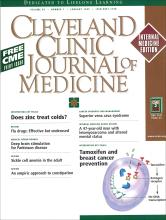ABSTRACT
Both amantadine and rimantadine are effective for preventing and treating influenza A, particularly in high-risk patients. However, they should be used judiciously due to the risk of central nervous system side effects and drug interactions. Zanamivir, a new agent for treating influenza, offers promise but needs further study and approval by the Food and Drug Administration before it can be recommended for routine use. Influenza vaccine, the most effective preventive measure, is widely underused.
Footnotes
↵* The author is the principal investigator in a study funded by Immunex Corporation, testing the possible adjuvant effect of granulocyte-macrophage colony-stimulating factor (GM-CSF) on influenza vaccine in bone marrow transplant and heart transplant recipients.
- Copyright © 1999 The Cleveland Clinic Foundation. All Rights Reserved.






